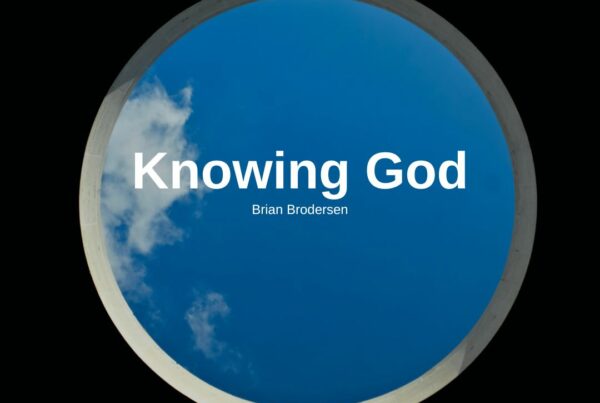
Billy Graham said, “The evangelistic harvest is always urgent. The destiny of men and of nations is always being decided. Every generation is strategic. We are not responsible for the past generation, and we cannot bear the responsibility for the next one; but we do have our generation. God will hold us responsible as to how well we fulfill our responsibilities to this age and take advantage of our opportunities.”
It has been said that the best evangelism tool is not tracts, nor crusades nor apologetic arguments, nor even servant evangelism; but simply being a faithful witness (and I would add that we need to be a witness with both our lives and our lips). I remember as a teenager that one of my worst experiences with a group of Christians was when they tried to share the Gospel with me. It was a drive-by (not a drive-by shooting like you hear about in Chicago or South Central LA, but a drive-by nonetheless). This was what I call “drive-by” evangelism!
One night some friends and I were hanging out in a mall parking lot late at night, most likely about to be up to no good. Suddenly a minivan full of Christian kids came flying up to us aggressively in the parking lot, and we assumed we were going to be struck by a water balloon or worse. Without warning, they rolled the window down and threw a bunch of gospel tracts out the window at us and kept driving, yelling out the window as they peeled off, “Jesus loves you!!!”
Picture that: The most important message ever given to man, the greatest news we can ever share with someone else, was just tossed out the window at our feet as if we were catching beads at a parade.
This is the essence of “drive-by” evangelism. Why is drive-by evangelism truly a problem? Here are three reasons:
1. Many people have demonstrated a poor Gospel witness with their lives.
Most of us have seen the spiritual damage that a poor witness can do for the gospel. Using Google’s “predictive search,” if you go and type in, “Why are Christians so,” look what pops up. These results are based on historical searches that real people have looked up. But I warn you. Don’t do so with liquid in your mouth, because it is bound to be spat out! These searches occurred because somewhere in the past someone who purported to represent Jesus actually misrepresented Him.
Many restaurant servers have admitted that Sunday afternoons are the worst days to work because the tips are so bad. That is usually when Christians have left their morning worship services and are going to be “salt and light” and “cheap” to the world. And that’s just tipping poorly. What about more grievous sins, like when a pastor falls into sexual sin? How does a local community see our message when the shepherd of a faith community is not even practicing what he preaches? Or when the guy at your workplace tells everyone he’s a Christian, but he is the guy who curses like a sailor and is pugnacious and dishonest and displays lust and wickedness and not godliness?
The gospel message is offensive enough without us helping make it more offensive with our sinful behavior! The message of the cross is foolishness to those who are perishing. It is also the power of God for salvation to all who believe. Men will get tripped up over the offensiveness of the Christian message, so why would we want to add a few more hurdles in there with our sinful behavior?
2. Drive-by evangelism doesn’t show genuine care for the person receiving the good news.
Like my friends and I in that mall parking lot, the “victims” of drive-by evangelism feel very little vested interest on the part of the evangelist. There is little risk, little involvement; no relationship, nor vulnerability on our part when we toss tracts at people we don’t know. The person who is on the receiving end of this poor method of evangelism feels almost violated or punched randomly in the gut by the gospel. Certainly the Lord can and does use random encounters, and if we don’t have the means to serve and live among certain people, we must resort to “faster” means to get the word out. But this should be a concession, not a normative practice. When Philip encountered the Ethiopian eunuch in Acts 8, he spent enough time to share Christ and see the man won to faith, but as soon as the man was baptized, Philip was “caught away” (Acts 8:39), and the man “went on his way rejoicing.” These situations will happen, undoubtedly.
However, most of us will have more contact with people then just 30 seconds to give them a drive-by gospel. My rule of thumb is that if I have more than five minutes together talking with a stranger, perhaps the Lord wants me to simply come right out and ask, “Do you know Jesus?” Or saying something like, “The world seems crazy right now! It makes you really contemplate life and death and the future. So what are your spiritual beliefs?”
3. Jesus demonstrates incarnation at its best.
We typically reserve our celebration of the birth of Jesus for the Christmas season, but it is important not to miss perhaps the most important doctrine about Jesus: His incarnation. Jesus, according to Isaiah 7:14, is “Immanuel, God with us.” Jesus demonstrates to us how we are to live a faithful Gospel witness in the very action of how He came from heaven to earth.
Jesus Christ was born of a woman. He was born to parents. He had uncles and aunts and cousins. He hungered. He thirsted. He got tired. He fell asleep. He yawned. He had internal organs, hands, feet and hair. His family was a part of a tribe of people in Israel. His family had traditions and beliefs. They celebrated holidays. They celebrated birthdays and traditions and sat around and had conversations. They laughed and cried and talked together. The application of this is powerful: God wanted to identify with us! Whenever I read the genealogy of Jesus, I am just so blown away that there are actually people listed! The Father loves us enough to send His Son to become one of us. He certainly could have broadcast His love and truth and nature from afar for all the world to see. But He sent Jesus to become one of us, to exegete the Father to mankind.
Augustine of Hippo said, “Man’s maker was made man that He, Ruler of the stars, might nurse at His mother’s breast; that the Bread might hunger, the Fountain thirst, the Light sleep, the Way be tired on its journey; that Truth might be accused of false witnesses, the Teacher be beaten with whips, the Foundation be suspended on wood; that Strength might grow weak; that the Healer might be wounded; that Life might die.”
Jesus, the Word, became flesh and dwelt among us. He “tabernacled” among us. The tabernacle is of course the location where God’s glory met man’s need, which was fully realized in Jesus. However, you and I are a temple of the Holy Spirit where His presence abides (1 Corinthians 6:19). We are to be “Christ incarnate” to the world, and that means willful, intentional, relational community that is purposeful and prayerful. We must be “in” the world and display with our lives the Gospel message we affirm with our lips.
Paul said in 1 Thessalonians 2:8 “So, affectionately longing for you, we were well pleased to impart to you not only the gospel of God, but also our own lives, because you had become dear to us.”
As we have opportunity, let us consider how we may live the gospel with incarnational intention, not merely in drive-by encounters. Thankfully in my life I had great examples of Christ-followers who shared Jesus and loved Jesus, and their message resonated with me until one day I too trusted my life to Jesus. If not for their faithful witness, I may have never found Christ. I’d still be in darkness, wondering what happened years ago in a mall parking lot with some church kids who had the right intentions but a missed opportunity to truly help some hurting, lost teens. When we do this faithfully, people will begin to take notice and will ask us “the reason for the hope that we have.” Are we ready to answer?
“You are writing a gospel, A chapter each day, By the deeds that you do, By the words that you say; Men read what you write, Whether faithless or true, Say—what is the gospel, According to you?” -Paul Gilbert









